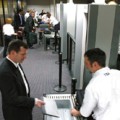US Airport Screeners Look for Behaviors
Five years after the attacks of September 11th, 2001, U.S. transportation officials are rolling out a new type of screening program at airports across the country. It doesn't require computers or high-tech x-ray machines. Instead, it simply calls for screeners to watch.
On a weekday afternoon at Boston's Logan Airport, State Trooper Jim Savage stops a passenger and asks a seemingly routine question: "So, where are you going today?" When the man tells him Chicago, Savage comments, "Chicago, that's a nice town," adding, "do you have any ID?" After a brief conversation, the passenger continues on his way.
Savage explains he was less interested in what the passenger said, than in how he said it. "Right off the bat you could tell he was a passenger, a business person, and that's what we're looking for: behaviors." Savage is one of about 140 Massachusetts state troopers trained in the Behavior Assessment Screening System, or "BASS." The program calls on the officers to patrol the terminals, observing travelers for signs of unusual behavior.
Officials won't say exactly what they're looking for, but Sergeant Peter Didomenica, who pioneered the BASS program at Logan Airport, says someone en route to a suicide mission can't help but display fear. "Adrenaline causes specific reactions to the body," he points out, "like increased heart rate, like perspiration, like sweaty palms, like increased breathing. There are also chemicals and hormones that affect the brain, your awareness. Things like tunnel vision could occur, auditory exclusion." So while terrorists may be getting better at outsmarting technology, there's almost no way to outsmart the primitive emotion of fear, according to George Naccarra, with the government's Transportation Security Administration, or TSA, in Boston. "A human cannot override those involuntary actions, no matter how much of a pathological liar you might be or whatever you've been trained in," he says. "It's not possible to further deceive your own body from trying to [dissipate] the stress that comes about with fear and deception." Boston's Logan Airport was the first in the country to use this type of behavioral screening. The state troopers' BASS program started shortly after September 11th, 2001. The federal program debuted about two years later and was tested at a handful of airports around the country. The TSA's Naccarra says the federal program, known as Screening of Passengers by Observation Techniques, or SPOT, is now making a nationwide debut. "We have our agency approval and our department approval to move outward and deploy it at other airports." But the program is drawing significant criticism. Civil liberties groups worry it could lead to racial profiling. And some, like University of Chicago law professor Bernard Harcourt, say it simply doesn't work. He points to a review of 39 research studies of behavior profiling, conducted in 2000. "[It] showed that the detection of deception was at about 44 percent correct. Now that's significantly lower than chance, so basically, the people in those 39 studies would have done a lot better if they'd just flipped a coin." Federal and Massachusetts officials disagree, citing the success of the Israeli security system. Rafi Ron, a former security director at Ben Gurion Airport, was brought in a few days after September 11th to train Logan employees. He says Israel has been thwarting terrorists with these techniques at airports and other public places for decades. "Terrorists have been attempting to attack shopping malls in Israel repeatedly over the last 10 years. I'm talking mainly about suicide terrorists carrying bombs, either in bags or on their bodies. In all those attempts, and we're talking about dozens of attacks, terrorists have never succeeded in entering the shopping malls." The security expert says that was because the guards recognized what they were before they had a chance to get through the doors.
But University of Chicago professor Harcourt, who's written a book on profiling, says the approach to security in the two countries is not comparable. "The Israeli security forces who are trained in behavioral recognition are elite forces," he explains, "specially selected for, among other things, having higher than average intelligence, and they're trained nine weeks." In contrast, TSA screeners receive about one week of classroom and on-the-job training.
Still, the TSA says its program could be the wave of a more secure future. It plans to train hundreds of baggage screeners across the country to double as transportation security officers. But the agency hopes Congress will eventually appropriate money to hire screeners, who will work only for the SPOT program.

